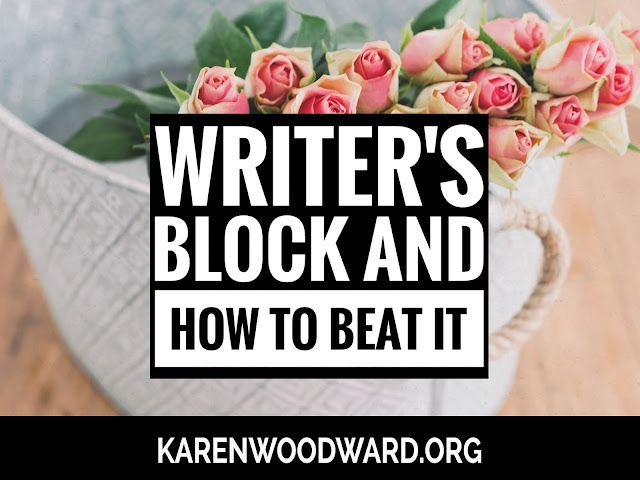I've been trying to write this blog post all day but the words wouldn't come.
I know all writers have experienced writer's block and know what a horrible feeling it is.
I know some folks deny there's any such thing as writer's block, that professional writers can't afford it. And they DO have a point.
But sometimes the words hover just out of reach. They peek around the corner then run screaming.
An hour ago I realized what was wrong: I had writer's block because I wanted to write something else! My muse wanted to work on the murder mystery I'm writing, but I NEEDED to write nonfiction.
The Secret to Curing Writer's Block: Compromise
Living with one's creative self, one's muse, is a bit like any serious long-term relationship: the key is compromise. I worked on my murder mystery for an hour (I set a timer!).
After the hour passed I sat down to write this blog post and the words (finally!) flowed.
Another thing that works is to write—or to TRY to write—for half an hour (or whatever span of time) and then, after half an hour, give yourself permission to do something else for ten minutes.
I find that, often, I end up working past thirty minutes because I've found inspiration. But it's important I know I have the very real option of stopping after half an hour.
Writing is about truth (at least, IMHO), and in order to write truth one has to be true to oneself. If your muse is leading you in a certain direction, try it out!
Do Something Else Creative
Take a break from writing and do something else creative: paint, draw, or cook. Do anything creative that strikes your fancy!
Chicken Noodle Soup: A Recipe
My favorite creative activity is cooking. I cook and I write. Today I made chicken soup. Here's my recipe:
Ingredients:
4 large mushrooms
1 zucchini, cubed
1 crown of broccoli
1 stalk of celery
1 bunch of spinach
1 sweet onion
1 head of garlic, crushed and cut up
5 medium tomatoes
4 or 5 chicken drumsticks or thighs
chile flakes
salt
pepper
civicha sauce (optional)
Method:
- Cut up the vegetables into bite sized cubes, including the mushrooms.
- Sauté the onions until almost translucent.
- Add garlic and sauté for 5 minutes or so.
- Add chicken and brown. I don't bother deboning the chicken, but it's up to you.
- Add enough water to cover everything, plus an inch or so.
- Add chile flakes.
- Cut stalk off broccoli and cut into cubes. Add to pot.
- Add celery.
- Add salt and pepper.
- Add cubed tomatoes.
- Simmer for 15 minutes or so or until the chicken is cooked.
- Add zucchini and mushrooms and cook for 5 minutes or until the zucchini has reached desired doneness.
- Taste the soup and add salt and pepper as needed. If it's not spicy enough (I love mine spicy!) I had a teaspoon or so of civicha.
Serving:
Put a handful of spinach in a large serving bowl and ladel the soup on top. Stir the soup, making sure the spinach is limp.
That's it! Add whatever vegetables you'd like, I sometimes roast them first (especially root veges) and add them at the same time as the zucchini.
If you try the recipe, let me know I'd love to find out what you've created. :-)
Every post I pick something I believe in and recommend it. This serves two purposes. I want to share what I like with you, and, if you click the link and buy anything over at Amazon within the next 24 hours, they put a few cents in my tip jar at no cost to you. So, if you click the link, thank you! If not, that’s okay too. I’m thrilled and honored you’ve visited my blog and read my post.
Today I'm recommending a reference book I have on my bookshelf, one I consult all the time. Next to Stephen King's On Writing, It's one of the most useful books I own. I'm speaking of Writing Tools: 50 Essential Strategies for Every Writer by Roy Peter Clark.
From the blurb:
"Ten years ago, Roy Peter Clark, America's most influential writing teacher, whittled down almost thirty years of experience in journalism, writing, and teaching into a series of fifty short essays on different aspects of writing. In the past decade, Writing Tools has become a classic guidebook for novices and experts alike and remains one of the best loved books on writing available."




